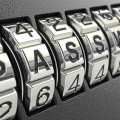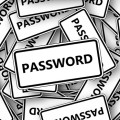Your PC network’s first line of defense is usually a password. But if you’re working with bad passwords then you run the risk of compromising this security.
Almost every computer application requires a password to access it. And, in business, these passwords can provide access to numerous terminals and networks. A lot of data is available on these computer systems and this is why security should always be a priority. However, your security can only be as strong as your first line of defense. And if your passwords are weak then your organization’s security is going to be equally weak.
There are certain mistakes associated with weak passwords that need to be eliminated from your business to keep it safe and secure. Let’s take a look at some of the most common password mistakes:
- Writing it Down: All over the country there are thousands of Post-It notes containing secure login details that are attached to PCs. This is a major security risk. Passwords need protection of their own. If they’re on display for the entire world to see then, that’s right, the entire world can take advantage of them. Instead, memorize the password or invest in a password manager.
- Sharing Passwords: Although not quite as severe as writing your password down, sharing passwords with colleagues is still a guaranteed method of weakening your password. It may feel as though sharing your password – if, for example, you’re away from the office and a colleague needs to access a document on your PC – is a safe move, but there is no guarantee that your PC will remain secure. If you do have to share your password then make sure you change it as soon as possible.
- Using the Same Password: You should never use the same password across multiple applications. If you do favor recycling your passwords in this manner then you can easily fall victim to password bots. These automated pieces of code are loaded up with login details – usually purchased on the dark web – and then instructed to try and gain access to other websites with them. So, if your LinkedIn login details have been hacked, it’s possible for a hacker to use a bot to try these details in Gmail, Twitter and Instagram. And, if the details are the same, you’re going to get hacked.
- Based on Personal Details: An easy method for formulating a password that you can remember is by basing it on some personal details. So, for example, you may use your date of birth or your mother’s maiden name. It’s unlikely you’ll forget these, so you won’t have to write them down and compromise their security. The only problem is that personal details can easily be accessed by others. And this is never truer than in the digital age where our personal details are splashed all over our social media accounts.
- Too Simple: A password needs to be complex, so working with passwords such as ‘123456’ and ‘Password’ is a poor strategy. However, due to the ease with which these can be remembered, many people use them as passwords. And hackers are aware of this. What you really want is a password which is unusually complex e.g. one that doesn’t contain recognizable words or number sequences.
For more ways to secure and optimize your business technology, contact your local IT professionals.







